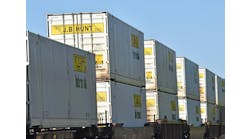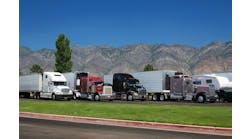Already a powerhouse in the less-than-truckload (LTL) marketplace, FedEx Freight (www.fedex.com) has expanded its services even further via its $780 million acquisition of long-haul LTL carrier Watkins Motor Lines. Watkins will be rebranded FedEx National LTL, and operate as a separate network within the FedEx Freight division, under the leadership of division president and CEO Doug Duncan.
"There is a two-fold opportunity here," explains Duncan. "In our FedEx Freight business, customers have been asking for long-haul for some time, so this acquisition enables us to grow our business with existing customers. But this also provides us a solution in the long-haul business we didn't have before, so there are targeted businesses that we can now go after.
"In a broader sense," he continues, "we've been successful in bundling the freight and package business together, yet even there customers have told us that we weren't giving them a complete enough solution on the LTL side and that they needed the long-haul portion. This acquisition will help us grow the freight business with both existing and new customers, and it will also help us to sell the package business."
Duncan claims that FedEx Freight's success has been a result of delivering next-day and second-day service for those companies executing fast-cycle logistics. He says that not having long-haul was a hole in their service offerings, since customers wanted an economical solution with FedEx Freight rather than having to go to another carrier for those deliveries.
With that realization, two years ago the carrier "started trying to figure out how to provide long-haul service," notes Duncan. "Clearly it had to be a separate network because to make next-day deliveries up to 600 miles and second-day delivery up to 1,600 miles, we force a lot of freight through our hub-and-spoke network every night, which makes it a high cost network, but for customers taking inventory out of the supply chain, it's an economical solution. Long-haul customers require a separate focused network to be able to achieve that cost effectiveness."
To FedEx, Watkins was the perfect fit. Duncan points out that Watkins has an entrepreneurial culture that he characterizes as being very similar to the cultures at Viking and American Freightways when they were acquired and merged to form FedEx Freight.
Looking at what was acquired, Duncan notes that Watkins has a very lean terminal network — about 167 facilities — and with that they are able to direct load a lot of freight, which gives them a cost advantage on the long-haul business by not forcing a lot of business through a hub-and-spoke network. "It's a very different model than ours and it works well," says Duncan. "The one piece they're probably lacking is that with their lean terminal network, they don't serve every point in the country. But now they have a sister company that delivers to every zip code in the country, one that can help make their model that much more efficient and attractive to the customer."
As part of the deal, FedEx is also acquiring Watkins Canada Express. Nevertheless, FedEx Freight's long-standing relationship with Canadian LTL and truckload carrier Day & Ross will not change.


